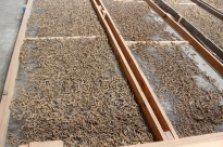
Source: Food and Agriculture Organization of the United Nations-http://www.fao.org/jamaica-bahamas-and-belize/news/detail-events/en/c/1377583/
Known for growing one of the most pungent and potent ginger varieties in the world, Jamaica is seeking to develop the sister root, turmeric, as a prime export crop, by the end of 2021. Presently, almost 90% of the dried turmeric used in Jamaica is imported despite it being said that Jamaican turmeric contains strong characteristics in flavour, colour and curcumin content.
Through a partnership with the Food and Agriculture Organization of the United Nations (FAO), the Research and Development Division of the Ministry of Agriculture and Fisheries and the Jamaica Agricultural Commodities Regulatory Authority (JACRA), Jamaica will today enter the first phase of developing its turmeric industry with a workshop introducing a new technology to intensify turmeric production.
The workshop on the Rapid Multiplication of Turmeric through the Single Bud Technology is the first of a series of trainings geared towards disseminating the technology across Jamaica to enable plant nurseries to grow and multiply quality turmeric planting material. Delivered by FAO Expert and Plant Pathologist Professor Duraisamy Saravanakumar, approximately 80 public sector technical officers, the private sector and plant nursery operators, will be trained in the benefits and implementation of this technology, which is successfully being used in India to grow spices.
Minister of Agriculture and Fisheries, Honourable Floyd Green remarked during the opening of the workshop that by increasing commercial turmeric cultivation, Jamaican farmers would see a 65% profit margin per cycle whilst also enhancing the socio-economic wellbeing of many of our rural communities. He added that the technology being introduced was critical to applying good agricultural practices to ensure that the country could drive the growth of quality turmeric.
The Technology
The Single Bud Technology is an innovation first introduced in the Caribbean by Professor Saravanakumar in 2017 during an FAO training geared towards resuscitating Jamaica’s ginger industry. Following the country’s devasting losses due to the Ginger Rhizome Rot disease, the technology aided in growing clean, disease-free ginger on a highly replicable scale, from the tissue culture stage to ginger plantlets, allowing farmers to have access to affordable clean ginger plantlets for production. This cost-effective technology is now to be used to build Jamaica’s turmeric sector based on the principles of good agricultural practices. Turmeric, which has similar growing properties to ginger will now enter its pilot project phase, as part of an industry business model introduced by FAO and JACRA to assist in scaling up production and creating an efficient and resilient turmeric value chain.
The Business Model
The turmeric industry will be built using a participatory value chain development approach, which leverages from the successes of the ginger value chain development process. Through value chain assessments conducted by JACRA and FAO, an industry business model that integrates the private sector will be developed to ensure that Jamaican turmeric can reap quantifiable benefits for the nation’s farmers, processors and exporters. This business model relies on the production of clean planting materials issued through certified nursery operations that have applied Good Agricultural Practices. Today’s training is the first and foundational step in this process that is crucial to the country’s ability to ensure the sustainable production of turmeric.
Big results
The turmeric pilot project is a 1-year 20-acre pilot that will involve turmeric nurseries, farmers, exporters and processors, significant public and private investment, training and research and development trials. By December 2021, the pilot is anticipated to result in a 25% increase in national turmeric production, the creation of approximately 34 jobs and the training of farmers in good agricultural practices and new technologies in order to increase yields by 100%. In addition, the cost of turmeric production is expected to decrease by approximately 33% allowing pilot farmers to earn up to JMD26 million from sales. Within the next five years, it is expected that the industry will grow and reach full potential on the global market and provide quality home-grown materials to the island’s sauces and seasoning manufacturers.
FAO Representative Crispim Moreira, noted that the “training in single bud technology is only a first step in maximizing the potential of the spices industry for Jamaica. By ensuring that this technology is carefully and strategically employed, the country will be able to deliver high quality planting material at an economical price to farmers and help in building and sustaining a robust turmeric industry for Jamaica.”
